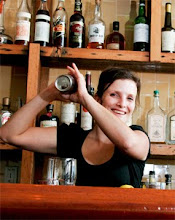
Since I started Small Hand Foods, I often get people asking me about my syrup-making process, so I thought I'd share some of it here.
When people find out what I do, one of the first things they say to me is, "Wow; you do all of that out of your house?" Um... what? No. You can't legally sell stuff you've made in your home kitchen. Actually, in some states you can certify your home kitchen, but California ain't one of them.
"Don't you need permits for that sort of thing?" Yes. You need a Processed Food Registration, food safety certification, Organic Processed Product Registration (if you use organic ingredients), seller's permit, Fictitious Business Name Statement, and business licenses in both the city you make the product in and the one you live in, assuming you do things like keep records in your house. There may be other permits you need for where you live; state and county offices will be able to tell you what you need.
If you are interested in starting a small food business, one of the big initial hurdles is finding a space to cook out of. Commercial kitchens are available for rental, but they can be expensive. They also may not have all of the equipment you need. Many people get their starts through the generosity of people already in the industry, myself included. I owe so much to the former owners of Fellini in Berkeley, Camino in Oakland, and of course, to Charles Phan and the entire Phan family of Slanted Door and Heaven's Dog. Often deals can be worked out when restaurants are closed; i.e. mornings in a dinner-only establishment, or on a Sunday or Monday when a particular restaurant is closed. I start cooking in the afternoon and usually finish midnight or later, because that is when the space I use is available.
I usually start each cooking session by picking up my produce from Berkeley Bowl. It's just slightly higher in cost than wholesale, they have the quality I need, plus they're really nice. I pack it into my cargo van (size 14). Here are 20 cases of organic pineapples.

I buy my bottles from California Glass. They mostly serve the wine industry, but have a number of other bottles and jars for people like myself. They're wholesale only and have a $500 minimum, which was daunting at first, but I got over that quickly. Now I buy from them about every six weeks or so.
I cook in really big pots. I have to stand on a crate to see inside.

Bottling by hand is really time consuming. Especially when the gum syrup is bubbly, and I have to fill the bottles, wait for it to settle, and top off each one.

I slip on the capsules then use the heat gun I have left over from refinishing furniture to shrink them on.

I used to use stock black capsules, but my bottles have these tiny glass bumps on the necks, and the capsules often broke and shrank away from the bumps.


I switched to custom capsules from C&E Capsules, and now they not only match my labels, the glass bumps no longer break through!

When I finish a batch, I've usually been working 12 or 14 hours. Plus the bottles are pretty hot, and I'm too tired and cranky at this point to wait for them to cool, so I put them away to label later.
Labeling by hand is also ridiculously time consuming. This is one of several times in this process where the economies of scale turn around and laugh in my face. How I wish I had a machine to do this! I use a ruler for the first bottle, then just visually line up each bottle with the first and apply the labels by hand.

I generally cook a larger quantity than I'll need at any given time, and I'll cook usually one or two products a week. I ask my customers to place their orders by Friday, then I know what I'll be cooking next and what ingredients I'll need to order. I cook on Mondays and Tuesdays, label and deliver on Wednesdays, then finish with my shift at Heaven's Dog Wednesday nights. I invariably get panicked calls on Tuesdays for syrups, and if I have the product in stock, I'm happy to oblige, but sometimes I get cleaned out. I do my best, though.
So that's my process. Like most small businesses, my company lives or dies with me alone. The rhythm of production doesn't afford me the luxury of illness, and I've been dreaming of a vacation for two years. But, like most small business owners, I love it, and I wouldn't have it any other way.
Some resources:
Small Business Administration: Frequent classes, most of them free.
Small Business Development Center: One-on-one counseling sessions: free!
In San Francisco:
La Cocina
Renaissance Center
